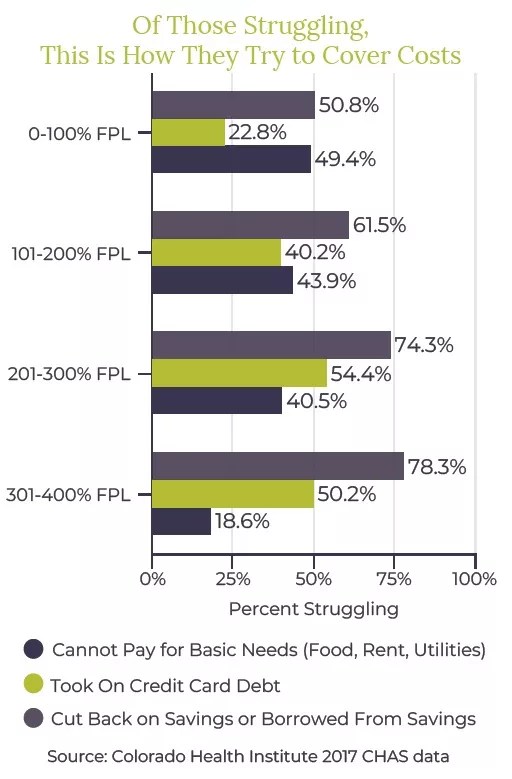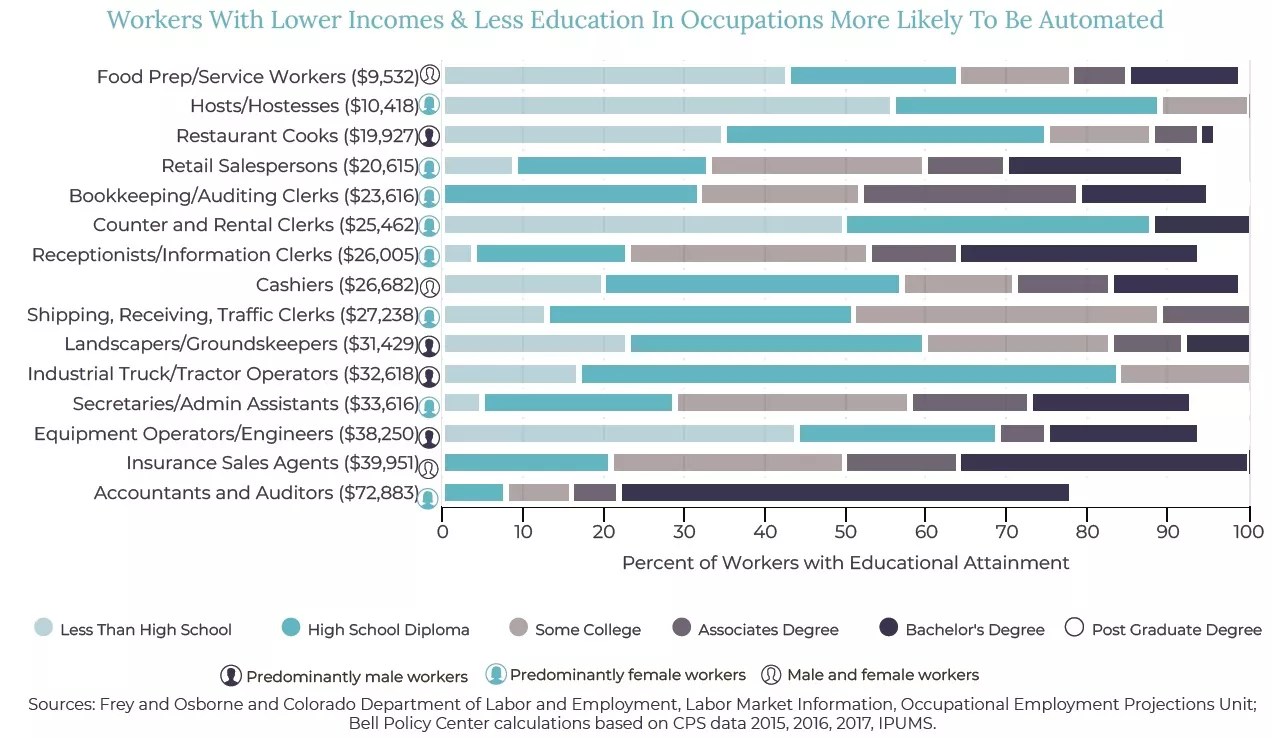
Getty Images

Audio By Carbonatix
As we’ve reported, many workers in Denver and beyond are finding it hard to make a living despite Colorado’s sustained economic boom. A new report provides insight about this apparent paradox by turning the spotlight on Coloradans struggling to make ends meet thanks in part to high housing costs, expensive child care and wages that have barely increased in real dollars during the past two decades.
“The economic growth and performance in Colorado is very strong,” acknowledges Rich Jones, director of policy research for the Bell Policy Center, whose analysis is entitled “Guide to Economic Mobility in Colorado.” He adds that “we have low unemployment, a lot of people are moving into the state and real estate prices are going up. But to some extent, the growth has been uneven. There are areas of the state that aren’t benefiting as much as others and people who aren’t doing as well.”
The report is accessible below in its entirety. But here are some of its key takeaways:
Colorado’s overall economic recovery stands out, but gains have been uneven throughout the state. Distressed communities persist both in rural and metro areas and Colorado is adding more low-wage jobs than any other. When adjusted for inflation, average weekly wages have only risen $33 since 2000….
Colorado families are hit particularly hard by the impact of low investment in public programs. At 3.7 percent, Colorado is investing a historically low percentage of its economy in services funded through the state’s General Fund….
As automation puts Colorado at a critical juncture over the next two decades, 477,000 Colorado workers are likely to be affected by changes in technology. Most of these are workers in low-skill, low-wage jobs….
High-quality early childhood education has become cost prohibitive for many families. The Colorado Preschool Program (CPP), which was designed to subsidize costs for low-income families, is only serving 20 percent of Colorado’s 3- and 4-year-olds….
Lack of affordable housing is a top concern for Coloradans. A household must make $21.97 to afford rent and utilities in Colorado, but the average renter wage is only $17.13. Nearly half of all Colorado renters are cost burdened, with an additional 24 percent severely cost burdened….
Child care poses a huge challenge for working parents, as 64 percent of Colorado children under the age of six live in a home where all primary caregivers work, but Colorado’s Child Care Assistance Program (CCCAP) only serves 13 percent of eligible families….

This graphic highlights those Coloradans most burdened by high rent costs.
Bell Policy Center
These findings reflect feedback received by Bell Policy Center researchers over recent months.
“This past summer, we spent time meeting people around the state,” Jones notes. “We heard from a lot of folks, and many of them talked about the high cost of housing. That was pretty universally a concern. And on the Western Slope, particularly, people talked about the availability and cost of health care, but also the notion that earnings are not keeping pace with the cost of living – or that even though people have jobs, they aren’t paying very well. They’re having to work two or sometimes even more jobs just to make ends meet.”
The data that jumps out for Jones includes “the average weekly wages in the state,” he says. “We went back from 2016 to 2000, and when we adjust for inflation, they are essentially flat – and you rally see the effects on the two recessions we’ve had since then on people’s earnings and on the economy. The Great Recession,” which dated roughly from 2007 to 2012, “was so deep and affected so many people that we forget about the early 2000s recession that up until that time had been the worst one we’d ever had.”
Also telling for Jones were the figures that emerged “when we looked at the number of people in certain occupations where the mean wages were equal to or below what it would cost for a family of four to stay out of poverty. In 2016, that was roughly $24,000 a year, and we looked back over that in time.”

The graphic depicts the most common ways Coloradans attempt to cover their expenses at times of financial struggle.
Bell Policy Center
Colorado “has always been a state that’s had a lower percentage of low-wage jobs compared to other states,” he continues. “But the percentage of those occupations went from about 13 percent to 22 percent. We still look better than some other states, but that’s a 69 percent increase for us – and that means there’s a bigger chunk of people working low-wage jobs in terms of the population than we’ve seen in the past.”
For individuals in this scenario, housing costs are what Jones characterizes as “a key factor, particularly in the Denver metro area and around the Front Range – looking at how much the cost of housing has gone up and how it’s risen faster than wages and other costs. We weren’t one of the states coming out of the Great Recession with a big housing bubble, like Nevada. But we’ve seen a big influx of people, and we didn’t build nearly as many housing units during a ten-to-fifteen year period that we needed to accommodate them. So we have an imbalance, with expenses having outstripped wages.”
No wonder that “when we talked to people in different parts of the state, housing tended to be at the top of their list,” Jones admits. “They’d say, ‘I feel really stuck. I can’t get ahead.’ And a lot of that is from the high cost of housing. We’ve had housing booms in Colorado before, but this one really stands out. If you’re currently a homeowner and you’re either not willing to buy a bigger home or move to a different house, things are going pretty well for you. But if you’re trying to get into the market to buy or you’re a young family with kids and you want to move out of your condo and into a bigger home, that’s really difficult now depending on what you do.”
Take child-care workers, for example. “Their average pay is a little over $12 an hour,” Jones says. “But what you need to rent a one-bedroom apartment is $17 an hour. So you have to work a job and a half just to be able to rent an apartment.”
One way to address this situation, Jones feels, is by allowing the minimum wage to be adjusted.

This graphic shows which low-wage workers are most in danger of having their jobs become automated.
Bell Policy Center
“We increased the minimum wage in 2016, and we’ll eventually get to $12 an hour,” he points out. “But if you look at the housing costs in Denver, Boulder and some of the mountain communities, we may be able to make a case that the minimum wage there could potentially be higher. The state prohibits having higher rates in different localities, but many other states allow different rates. So one of the things we might be able to do is amend the statute to allow localities to set a higher minimum wage than the state.”
Still, folks in these professions aren’t the only ones unhappy that dollars no longer stretch as far as they once did. “In Denver, the city is worried about firefighters, nurses – people with regular jobs whose average wages may not allow them to afford things that we think of as being part of a middle-class lifestyle,” Jones says.
The Bell center’s guide doesn’t only list problems. Its authors also make suggestions about potential solutions.
“We have a lot of discussions about improving the job skills people have,” he stresses. “There’s clearly a demand in our economy for workers with specific skills. If we can ensure that people can develop those skills, many of them can go on to get jobs that will pay better and offer a career path where they can move up over time. Those are the kinds of things that can really help address the issues a lot of us are having these days.”
Click to read the Bell Policy Center’s Guide to Economic Mobility in Colorado report.